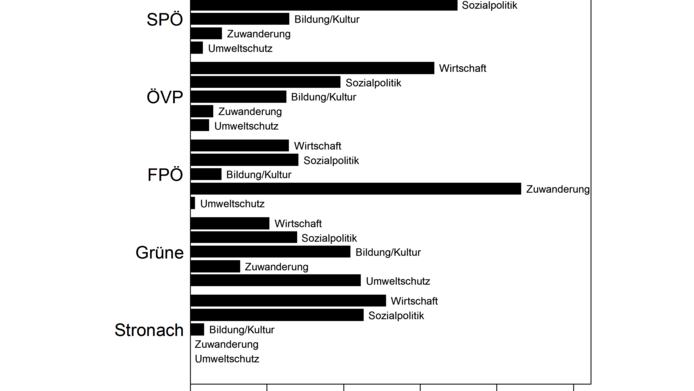Voters’ choices ...

The welfare state, the economy and integration – these topics are mainstays of Austrian election campaigns. This was the case in 2008, again in 2013, and they will most probably be at the forefront in the next parliamentary elections. “These issues, mainly social justice and the economy, were also significant in the past”, notes the political scientist Sylvia Kritzinger from the University of Vienna. – So they already were in the 1970s and before. And yet, something has changed fundamentally.
From camp-followers to swing voters
“In the past, people used to vote more consistently along ideological lines, in accordance with the so-called ‘class cleavages’. Someone with a working-class background would on the whole have no doubts about who to vote for. The same was true of farmers and entrepreneurs. The outcome of elections was much more predictable then”, states Kritzinger. Since the 1970s, however, strict voter allegiance has been eroded. “This is linked to the emergence of the middle-class, whose members do not feel aligned with just one party and its issues and have thus evolved from loyal camp-followers to swing voters. For this group, issues and the importance assigned to them impact their voting behaviour.”
Relationship triangle: Parties, media, voters
Elections are considered the epitome of democracy. They represent the focus of public debate, they shape the political agenda, and they influence the composition of parliaments and governments. In some ways they may be seen as a temperature chart of political dissension. Elections help crystallize a notion of what is important and what people are concerned about. At the same time they are a highly complex process in which parties and their candidates act on the supply side, voters on the demand side and the media as facilitators - and these three groups are in constant interaction.
Election studies reveal transformations
While it is a tradition in well-established democracies for elections to be analysed by social scientists, an integrative analytical approach based on the relationship triangle described above is unexplored territory. With the support of the Austrian science fund FWF, the Austrian National Election Study (AUTNES), has set out on this endeavour. “Our research demonstrates that the significance of a given issue has an increasing influence on which party someone will vote for”, explains Kritzinger, who heads the sub-project “Voting Behaviour” in the FWF project. This is not necessarily a simple process from the voters' standpoint. “There may be people for whom job security is important, for instance. And they may see that issue to be linked with migration, putting increased pressure on the labour market because of immigration”, notes Kritzinger. In this case all depends on which issue is of greatest significance from the point of view of the individual. “Cross pressured vote” is the technical term given to this phenomenon, when voters need to pick a key issue.
Fight for thematic leadership
“This is why political parties try to become ‘issue owners’, meaning that they try to demonstrate the highest competence in a certain area and take possession of it so convincingly that no other party can undercut them. In addition they can stake out new issues, which makes them ‘issue entrepreneurs’. If they do that successfully, that strategy will give them the highest level of credibility”, observes Kritzinger. If this happens, all that is left to their political opponents is to react, putting them at a strategic disadvantage. “It’s just like in the business world, whoever launches a product first will dominate the market”, so runs the comparison with the economy that Kritzinger uses. And just as in the world of business, market gaps may emerge. “By going into a coalition with the SPD, the CDU has exposed its right flank by strategically backing leftist positions”, the scientist comments regarding the situation in Germany. “This provided an opening for the right-wing AfD to seize certain positions and issues.” In the case of Austria, the scholar notes how one can currently see issues being revived. Here the Social Democrats (SPÖ) are strongly refocusing on traditional positions through the new party leadership, in order to emphasise their ownership of certain issues. “Politics is all about the art of theme setting”, is how Kritzinger sums up the process.
Monitoring of the society
The data collected by AUTNES since 2008 for national and European Union elections enable the scientists to observe these developments and understand them more fully. “There is a continuous monitoring of our Republic and Austrian society, so we are able to show which issues are important, whether they emerge domestically or come from the outside, for instance from the EU.” Sometimes local issues may also have a surprising impact on national elections. “In 2013, the issues were the economy, the welfare state and migration, but in Vienna the pedestrian zone set up in Mariahilfer Strasse was perceived as an important issue.” Even though it was not negotiated in Parliament, the conversion of this major shopping street did feature strongly in the awareness of many voters. In this way, the work of AUTNES creates something like a detailed psychological profile of Austria and its society, charting developments and changes. “We are at the beginning of a long-term project which will make it possible 20 years from now, or even later, to answer questions such as why attitudes change, how issues gain or lose significance, and what factors played which role.”
Personal details Sylvia Kritzinger held a post as lecturer at Trinity College Dublin, followed by a position as assistant professor at the Institut für Höhere Studien (IHS). In 2007 she was appointed as a professor at the University of Vienna, Department of Government. Her publications are devoted to the topics of European integration, public opinion and party politics in journals such as Science, European Union Politics, Electoral Studies, West European Politics and the British Journal of Political Science. Within the context of AUTNES, she heads the sub-project on “Voting Behaviour”.
Publications and contributions






